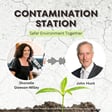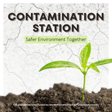Introduction to Contamination Station
00:00:01
Speaker
Welcome to Contamination Station, safer environment together, a New South Wales EPA funded podcast. In these episodes, you'll hear from those working to implement contaminated land policies and procedures at the local level by sharing our stories, frustrations, wins and losses. Our aim is for this podcast to become a repository of information that will support those currently working to combat contaminated land and for those yet to come.
00:00:30
Speaker
Hello and welcome to this episode of Contamination Station, an EPA funded podcast.
Guest Introduction: Sarah Mansfield
00:00:36
Speaker
I'm your host, Chanel Gleason Willy, and our guest today is Sarah Mansfield. The views and opinions expressed in this podcast are solely those of the host and the guest as individuals, and do not necessarily reflect those of the New South Wales EPA or any other organisation.
00:00:53
Speaker
Today's episode is a conversation with Sarah Mansfield, an environmental and planning lawyer based in Sydney. Sarah has extensive transactional litigation and advisory experience. She advises and acts for government authorities, landowners, developers, and financial institutions on matters related to contaminated land, pollution, waste, vegetation, and planning and environmental approvals.
Legal Challenges in Contaminated Land
00:01:19
Speaker
Hi, Sarah. Thanks so much for your time. Great to be here.
00:01:22
Speaker
Sarah, some of your main clients regarding your work area of contaminated land are commercial clients dealing with industrial sites and some really complex contamination issues. What type of legal issues do you deal with during these cases and who pays the remediation costs? Is it the purchaser throughout the process?
00:01:43
Speaker
Yeah, that's a really good question and it actually sort of brings up one of the main reasons I love working in this area because it's a real matrix of legal issues. So you have the law of misleading and deceptive conduct. So if a vendor is making certain disclosures or being silent on issues associated with the property, that law potentially comes into play. You also have statutory obligations. So
00:02:09
Speaker
Will the purchaser need to report the site under Section 60 as soon as they step into the shoes of the owner? Or will they assume some liability under the Contaminated Land Management Act because they're changing the use of the site so you have those legislative issues? There's obviously some planning issues if they're redeveloping the site. Are they going to have to do extensive works to ensure that the site is suitable for the proposed development?
Who Pays for Remediation?
00:02:35
Speaker
And then there's also the contract issues of, well, we've got this big nebulous liability. There's on-site issues and there's off-site issues. For example, is the new owner going to be sued by the neighbouring land or users of the spaces and waters under the law of nuisance and negligence? And if so, how might they want to be protected?
00:02:56
Speaker
It is misleading and deceptive conduct law under the federal legislation. There's state-based laws, contaminated land management act, planning legislation in the set, as well as potentially other laws. There's contract law and there's also the
00:03:12
Speaker
tort law being primarily the law of negligence and nuisance. It is a lawyer's picnic in terms of the field of laws. In terms of who pays for any remediation costs, there is never one answer to that question. It is for the parties to decide in large part how are they going to split that liability
00:03:35
Speaker
One way of doing it is the purchaser will do certain works and then the vendor will do certain works and then the purchaser will come in and complete their development. Sometimes the purchaser might be comfortable to take on the liability for the on-site issues because that's their site. They're going to redevelop it and remediate it in the course of that redevelopment in any event.
00:03:56
Speaker
But they'd really prefer not to be sued by adjoining landowners and they might want an indemnity from the vendor in relation to that. So you can slice it and dice it every way. I've been working in this area for a long time and no two transactions are ever the same. So it always, hopefully, is a meeting of the two parties needs to create, if not a win-win scenario, something that is acceptable to both of them.
Need for Tailored Legal Advice
00:04:26
Speaker
But of course, sitting in the background or in sometimes in the foreground is the EPA and you cannot contract out of liability under the contaminated land management act. So that needs to be factored in as well. So yeah, there's no one answer as to who pays the remediation costs, but the EPA will always look to the polluter.
00:04:48
Speaker
or the person responsible under that legislation to carry out any remediation works that they consider necessary. But if that person is not available, then it will fall to the landowner as a general rule and that always needs to be.
00:05:04
Speaker
taken into account. Very complex, always bespoke arrangements between the parties and then the EPA will exercise its powers as it sees fit and you cannot contract out of that. That reality needs to very much be taken into account in any contractual arrangements.
00:05:22
Speaker
Yeah, it's such a complex area. So we did start by saying that you deal with a lot of commercial clients and I guess large industrial sites.
Balancing Resources in Environmental Law
00:05:30
Speaker
But it would also apply on a smaller scale to residential clients. But is that something where you would get involved very much or is it an area where it kind of gets watered down a little bit?
00:05:42
Speaker
Oh no, we act for everyone. I think it's important as a lawyer actually to make sure you sort of don't just act for one particular type of client. So I say I act for polluters and I act for the victims of pollution. So definitely all sides. On the residential property point, they can actually be some of the hardest matters because you're dealing with limited
00:06:08
Speaker
resources. Just because the contamination may not be the biggest source or the most complex, that doesn't mean that its impact isn't significant or it may be a residential property. You may have a mum and dad and it may be really nasty contamination and you need someone to do something about it.
00:06:28
Speaker
We use different strategies for different circumstances and we tailor the advice and the strategy to the circumstances of the client. But yeah, I quite enjoy acting for individuals as much as I enjoy acting for sort of the bigger end of town. And certainly government clients, they wear multiple hats.
00:06:48
Speaker
So they can be a landowner, they can be a consent authority, they can be a regulator, and they can be all those things at once sometimes. So you really need to tailor your advice and your strategy to the client that you have before you and what's the smartest decision for them in that circumstance.
Regulatory Overlaps and Site Remediation
00:07:08
Speaker
One thing I would really love to discuss with you is how you see the differences between Site Remediation via the CLM Act, POEO Act and the EPA Act. Quite a lot of questions. Yeah, it's really interesting because there's huge overlap between all three pieces of those legislations. So I can find a way in each of those acts
00:07:33
Speaker
to cause someone to have to do remediation works if I'm acting for the appropriate regulatory authority. However,
00:07:43
Speaker
In terms of what happens in practice, the focus of the Contaminated Land Management Act is really on preventing a site or preventing contamination from causing an unacceptable risk of harm. There are criminal provisions within that act, but that's not really the focus of that act. It's really about getting sites cleaned up.
00:08:04
Speaker
The POEO Act also has cleanup provisions, but it, as a vast generalisation, is used to punish or pursue people who have done naughty things that have harmed the environment. And then the focus of the EP&A Act is more on, okay, someone wants to do a particular development or works, how are we going to regulate?
00:08:27
Speaker
how they go about that in order to ensure that it's safely or appropriately done or doesn't have any unacceptable amenity impacts. So each of those pieces of legislation have different focuses, but you will often have overlapping regulation. You can also
Case Study: Management vs. Practicality
00:08:44
Speaker
have a circumstance where you have a consent authority as well as the EPA seeking to regulate the same subject matter
00:08:52
Speaker
at once. For example, if you're carrying out contaminated soil treatment works on site as part of a development, you might require an environmental protection license under the POEO Act, as well as a development consent. So you have the EPA and potentially a council, for example, regulating the same subject matter. And then if the site falls within the purview of the CLM Act, you can in theory have that apply as well.
00:09:17
Speaker
So, there are different focuses and sometimes you end up with all three applying and sometimes you do it as complying development and it gets through and there's sort of minimal legislative regulations. So, yeah, some overlap but definitely different focuses in terms of practicality and the legislative provisions as well. Sure. And do you have any specific case studies you're able to share to highlight the differences for this?
00:09:42
Speaker
Well, one of the best cases I can talk about because it went through the courts is the Jeffman and Lawrence dry cleaners decision and the EPA. That decision is getting a bit long in the tooth, but it was where a management order was issued under the contaminated land management app.
00:10:01
Speaker
by the EPA and the terms of that management order effectively precluded the persons who are accepting responsibility for the contamination from implementing their preferred remedial strategy. One of the big discussion points in that case or points of contention was, well, if we implement
00:10:22
Speaker
other remedial technologies such as thermal treatment, would that require a development consent and would that consent actually be granted? And so then you would – what the scenario we were trying to avoid as well.
00:10:37
Speaker
a management order saying certain things had to be done in certain time frames. But then the approval requirements that that would give rise to would make complying with the order extremely difficult, if not impossible. So that was one of those tensions as well. I've also had other circumstances where a client has been surrendering an environment protection license and the surrender conditions
00:11:04
Speaker
required remediation works. Simultaneously, there were orders being issued under the Contaminated Land Management Act and the two didn't talk to each other. You had duplicative requirements and certainly what my client felt was wasted expense.
00:11:22
Speaker
carrying out two different works in different time frames essentially to satisfy the same thing. That was a point of frustration that you had one arm of the EPA saying one thing and another branch saying the other in that circumstance. And simultaneously, they're trying to carry out their development in accordance with their consent.
Regulatory Collaboration
00:11:43
Speaker
So yeah, this is not a theoretical thing that happens. It is something that really does happen.
00:11:51
Speaker
can be very confusing for clients as well as for consent authorities because they don't know until the client brings it to the attention that they've got all these other requirements. No one actually wants that scenario. It's just something that can happen.
00:12:06
Speaker
So in the reality of that situation, was it that they had had to do two vastly different lots of works on site or was it more a double up of paperwork and reporting? A little bit of a combination of both. Practically how we dealt with it is that we got all three regulators to the site at once and we said, well, you know, you're requiring this by this timeframe, you're requiring that
00:12:31
Speaker
Our proposed way forward in order to meet what we understand your objectives to be is this, is everyone comfortable? You know, we get everyone comfortable and we say, oh yes, could you please then amend the notice you've issued under the POEO Act and could you please amend the notice you've issued under the CLM Act?
00:12:48
Speaker
blah, blah, blah. Or certainly another way of going about it is to encourage regulators to focus on the objective they want to achieve or the cleanup standard and then leave it to the client and a site auditor as to the granular detail as to how they get there. And we do that for many reasons.
00:13:08
Speaker
including because things happen on site, they turn up on site that are unexpected. My years of practice has taught me expect the unexpected. And so if you regulate too tightly, it creates a lot of stall points and inefficiencies. And so if we could focus on achieving the outcome and give everyone comfort that that outcome will be achieved through the
00:13:31
Speaker
oversight and involvement of a site auditor. That's a way to sort of lessen the overlapping regulatory burdens as well. Yeah, definitely sounds like the best approach is to get everybody in the room talking.
00:13:44
Speaker
Yes. Yeah, where you want to end up at the end of the day. Yeah, work together. And it's for the client, I think, often to be proactive in that regard and put the proposal and lead that discussion. I do think that generally is the best approach and people realize what you're doing and are sensible about it. It's just you need to be aware of it and be proactive in managing it.
00:14:08
Speaker
Yeah, definitely.
Avoiding Litigation in Environmental Cases
00:14:09
Speaker
Now, as part of my role for what I do for some of our clients is I endeavor to educate them on the reality of potentially going to court as a result of criminal proceedings under the mostly, I guess, the POEO Act usually after a pollution incident.
00:14:24
Speaker
We do this through education that can sometimes include mock trials, mock court, but this is not the real thing, obviously. Can you tell me a little bit about what it's really like for a company and the people involved to end up in that situation? Look, firstly, I'd just to say, if you ever need someone to pretend to be a lawyer for your mock trial, sign me up. I can do a very good impression, I think that.
00:14:47
Speaker
A tremendous idea and it sounds like a lot of fun. It'll take me back to uni days during a mock trial. Look, the first thing I'd say about having to go to court and be a witness or even just have to sit there and listen to your company be discussed, it is deeply, deeply fatiguing and
00:15:08
Speaker
All you can be sure of is that things will not go as you expect, no matter how well prepared your team are. I've most recently had an example where my poor client was in the witness box and a line of questioning was being put to him for hours. It was a complete red herring, ultimately, but you can't help but sit there and go, where is this going?
00:15:32
Speaker
How do I avoid the trap that I think they're trying to set for me? It's very discombobulating and confusing. It's very easy, particularly after you've been in the box for a while, to say something that you don't mean or to be misunderstood. I cannot explain the fatigue and how draining it is.
00:15:55
Speaker
how, as a consequence, it is very easy to be compelled or fall into saying something that you don't mean, and that can be the end of the ballgame. Once those concessions are made, it's very difficult to crawl things back, so it's very high stakes. You have little control often. You really put your case in the hands of
00:16:17
Speaker
the judge and it's a very difficult and draining scenario. It is very high risk. No matter how right you think you are and you may well be, you're giving a decision over to a third party and that is the reality of it. So, I really do try and prepare my clients also for that reality. I be lying to say if I don't try to avoid it where I can,
00:16:42
Speaker
to give because of the interests of certainty, to avoid the stress, to avoid the tremendous cost that comes with litigation, to avoid the adverse publicity that comes with litigation, and to enable clients often to move on with their lives and their businesses and invest their time and money and energy into more productive ends. Now, that doesn't mean
00:17:06
Speaker
Litigation isn't an appropriate avenue or a necessary one, particularly if it's being brought against you in certain circumstances, but I certainly weigh all those factors off before implementing a strategy. Litigation is very good for lawyers, but it's not necessarily in the best interests of clients.
00:17:28
Speaker
Let's move on now to talking about the new consolidated SEP.
Outdated Guidelines and Council Challenges
00:17:34
Speaker
What are your thoughts on the new SEP and the current deficiencies which haven't yet been amended? It'd be interesting to hear your thoughts on this.
00:17:45
Speaker
So I got really excited when I heard that there was a new set. I'm like, ah, this has been in the, you know, this has been a long time coming. Let's look at the contamination provisions. Ah, they're the same as they were.
00:18:00
Speaker
Think we're all on the same page. Yeah. Am I missing something? Do a dot compare? Nope. Nope. They're the same. So that is what it is. I guess the contamination provisions are a little bit harder to find if you're not in the know, but they are essentially the same.
00:18:16
Speaker
But I think the real issue is the failure to update the guidelines, which have been in place since 1998. There were some years ago proposed update to the guidelines, which were controversial, I'm not necessarily saying, or I'm not saying that we should have implemented them. But a lot of things have changed since 1998. And because the guidelines haven't been updated, I think the role of councils is made more difficult.
00:18:46
Speaker
And also, there's a whole bunch of missed opportunities because we have so many more tools and knowledge than we did since 1998, but councils don't have any statutory guidance as to how they should be used. For example, we now have certified environmental consultants. They are not featured in the guidelines. The list in Table 1 in the guidelines, which identifies the uses of land which are likely to cause contamination, haven't been
00:19:13
Speaker
They don't include PFAS contaminating activities on all PFAS contaminating activities. And this makes the lives of councils very difficult. And it also potentially means that they're not going to be able to take full advantage of the statutory protection from liability provided under the EP&A Act.
00:19:35
Speaker
if they comply with the planning guidelines? Because where the guidelines are so far behind, how do you say that you're complying with them when you're using tools which weren't even thought of at the time the guidelines were written? My answer to that question for anyone who's interested is, well, please make sure you have a contaminated land planning policy, which deals with the modern day realities of regulating contaminated land.
00:20:01
Speaker
But that really is putting the onus on councils to come up with their own policies for dealing with these things rather than having the benefit of broader guidance.
00:20:11
Speaker
And yeah, some of the work that we did with the EPA was around this space and trying to get a model policy off the ground is not an easy thing to
Legal Risks for Councils
00:20:19
Speaker
achieve. No. So do you think that planning authorities are being left without important guidance? And I guess we spoke about that a bit in that, yes, they are, they don't have that and they need to put in place their own policies. But is it leaving them open to further legal proceedings and what type of legal proceedings might those be?
00:20:38
Speaker
Yes, it is leaving them more open. Firstly, for the reason I mentioned before, which is in the APNA, there is a presumption against liability for councils for anything done in the course of exercising a planning function if they have done so in good faith and you're deemed to have done so in good faith if you've done so in accordance with the planning guidelines for contaminated land. But it's also important just to remember
00:21:06
Speaker
Am I exercising a planning function or am I doing something that wouldn't fall within the scope of that protection? Because part of what makes councils such interesting places to work and such wonderful clients is they wear many hats. Sometimes councils are the polluter or the person responsible.
00:21:26
Speaker
for a polluter. Sometimes they are the owner or a lessee of land and so you have additional roles and responsibilities in those circumstances. So councils can certainly find themselves the subject of orders under the Contaminated Land Management Act. Councils have duties to report contamination. Councils also have potentially a duty to report a pollution incident. So if you're doing something on a contaminated site which is causing a
00:21:54
Speaker
Pollution incident, for example, I've had circumstances where works on a contaminated site have led to contamination leaching into a water body while my alarm goes off and I'm like, ah, is there a duty to report here? What cleanup actions do I need to take under that legislation?
00:22:10
Speaker
And certainly councils can be subject to the law of misleading and deceptive conduct. They can enter into contracts with third parties, including purchases about liability for contamination. And if they don't comply with those obligations, they can be sued for breach of contract. And if a council is responsible for a site or works and they have impacted neighbouring lands, well, then they might be sued under the law of negligence and nuisance as a minimum.
00:22:41
Speaker
So, yes, everything, they can potentially be sued under all of those causes of action, misleading and deceptive conduct, nuisance negligence, contract law, because of what counsellors do in relation to contamination.
Disclosure Obligations for Councils
00:22:56
Speaker
And so that's why it's really important as an officer to think, okay, what circumstance am I in? What hat am I wearing at the moment? Or how many of these hats am I wearing? And to adjust your conduct.
00:23:10
Speaker
accordingly to meet those capacities. Let's talk about the contaminated land assessment by councils and how this interacts with the purchaser and their due diligence that they have to go through a little bit further. We have already touched on it in that, yes, councils do have a duty to disclose and they want to be making sure that they're doing their due diligence properly.
00:23:38
Speaker
But what does that actually mean for a council? This is really hard for councils. And the law that's primarily coming into play here is that law of misleading and deceptive conduct. And there are a couple of things to note from the outset, which is you can be misleading or deceptive and fall foul of that legislation and be potentially liable for damages completely unintentionally.
00:24:06
Speaker
And it's about the corporate knowledge of the council, not the knowledge of the individual. So a particular officer in council might think that they're being completely frank and comprehensive with whoever it is that they're talking to. But if there's some other document in the back room of council, or if somebody else knows something within council that that individual doesn't know, and they therefore completely innocently sail to disclose it, then
00:24:34
Speaker
they may be subject to a claim for misleading or deceptive conduct. And that's why having comprehensive records available and disclosing all available records of potential relevance to purchases who ask to see them or ask relevant questions is really important.
00:24:53
Speaker
The other thing that's really important is to avoid, I think, making commentary on a site and letting the record speak for themselves. Because as soon as you give a particular gloss or an opinion, that's where you run a real risk of innocently, but giving someone, making a misleading statement and potentially being to the detriment. And this is not an issue that's unique to councils. When I'm acting for a vendor, selling a site,
00:25:23
Speaker
Our general rule of thumb is you disclose absolutely everything and make no commentary or you stay completely silent. That's an option that's available to you, which isn't always. But I think for a council, that option is basically never available. So you need to disclose as much relevant information as you have and really avoid making too much commentary or any commentary about it is the safest bet.
00:25:50
Speaker
The other thing that I think is useful is in your contaminated land planning policies, when you're issuing planning certificates, saying what information you will disclose on planning certificates over and above the mandatory.
00:26:07
Speaker
information and having a policy around that and being consistent about that. Because if you made certain disclosures about the site next door, but then not the subject site, did you create an expectation that you would make certain disclosures? So having a policy about that and implementing that policy consistently is another thing that I think can be really helpful for councils to do.
00:26:32
Speaker
And some councils do have the contaminated land registers and potentially contaminated land registers, and that's the spot to put down if you're going to disclose that information, is that correct? Yes. I think so long as you have a consistent method and say, this is how we do things, and then sticking to what you said you were going to do in a policy and not having individual officers going, oh, okay, you've asked, so I'll just pull this, I know about that.
00:26:59
Speaker
Even though it's extremely well intentioned and may well be very helpful, I think having a policy and implementing it consistently and having that system is the best way to protect yourselves and avoid that half-truth, which is what in my experience most readily results in claims because you didn't give the full picture.
00:27:23
Speaker
but really heavy task for councils. Very difficult. Yeah, definitely. And we've had a situation recently where we had a vendor who was asked by a real estate agent to sign a form to do away with all of their privacy around a property that they were selling to a purchaser. Now in that situation, that form was going to go to council to release all information about that property as far back as they can go.
00:27:51
Speaker
Does the council actually need the approval of the seller, the vendor, to release all that information, or is it part of their due diligence to do it regardless? I think it's part of you go to the GIPA legislation and follow that process, but I think as soon as you give information or a document to a council,
00:28:12
Speaker
I think it's potentially open for the world to access it, so I don't know that you necessarily need the vendor's permission to disclose that information. I think you go back to the requirements of the GIPA legislation and you implement that. But once you give it to a council, in the vast majority of cases, there's no privilege attaching to it. That's long gone. It's on the public record and I would think it would need to be
00:28:40
Speaker
need to be disclosed. That said, I understand that councils consult with third parties or the purported interested parties who owned or created or commissioned the document. I'm not discouraging that, but in terms of being able to stop a council disclosing a document, it's hard to imagine a circumstance in which that could happen. Interesting.
Court Rarity and Enforcement Notices
00:29:02
Speaker
When might a council, in addition to what we've discussed, have to disclose matters related to contaminated land to a potential purchaser? I guess in a situation where maybe the purchaser doesn't specifically request the information. Is there a situation like that?
00:29:17
Speaker
Where the purchaser has made a general request, but not a specific request for information. When I'm advising a purchaser and they're doing a GIPA, we cast it as broadly as possible because you don't know what you don't know. So it's very hard sometimes to request a specific document.
00:29:37
Speaker
So, if they've cast it broadly, the council following the procedures in the GUKA legislation would need to disclose everything that's within its scope, even if it's not specified. Now, I guess looking at everything from large commercial industrial all the way through to your mum and dad residential.
00:29:56
Speaker
What's the actual occurrence of CLM cases going legal? Is it something that happens relatively often from your perspective? Sorry, I guess it depends on what you mean by going legal. I think it is still the case that the Geoffman Lawrence-Drowcleaners and EPA decision is the only case under the Contaminated Land Management Act to be decided by the Land and Environment Court.
00:30:21
Speaker
But notices are issued under the CLM Act all the time, and that's because that's the focus of the CLM Act. The EPA wants to compel or ensure that sites are remediated within appropriate time frames, and often the costs of remediation far outweigh
00:30:42
Speaker
the penalties handed down by the land and environment court. So just because a case isn't ending up in court doesn't mean that it's not really hurting individuals and companies. And I think to touch up on something you said earlier, it's really the POEO Act where criminal cases are brought against individuals. Certainly one issue that I think will be looked at
00:31:08
Speaker
or needs to be looked at is the duty to report under section 60 and the compliance and enforcement with that. And that's an area where that might be the subject of some legislative amendment or certainly the settings on that.
00:31:25
Speaker
appropriate. But yeah, just because cases under the CLM Act aren't ending up in court, doesn't mean that they're not the tools available to the EPA under the CLM Act are being used because I can tell you they are or what the EPA prefers to do. And I think this is often in the interest of client as well as, you know, speak softly and carry a big stick. You come to us with your proposed remediation works in your proposed timeframes,
00:31:51
Speaker
And or if you don't come up with something appropriate, we will eventually issue with an order requiring you to do it. And then you lose a degree of creative control, which is when you're carrying out costly remediation works or you're trying to do remediation works in conjunction with redevelopment is something that sometimes is better avoided.
00:32:12
Speaker
Now, for our final question, I want to touch on the future and what the contaminated land space looks like into the future because the industry has come so far since the late 90s.
Improving Environmental Management
00:32:25
Speaker
There is so much more knowledge out there around the types of contamination and remediation, and it's grown from a very, I guess, yeah, small industry to a very significant industry, especially around capital cities.
00:32:40
Speaker
with some very well-known landmark sites and cases which have been remediated very well over the years. So I'd love to know what's your opinion on the future of contaminated land management, especially around the legal space?
00:32:56
Speaker
Well, I think the big issue, and this will be unsurprising to many that I think this, the big issue that I think needs to be addressed by legislation is the registration and enforcement of environmental management plans. We rely very heavily on those plans to keep our properties and communities safe. But at the moment, their enforcement and how, who and how they're enforced and even who and how
00:33:25
Speaker
the incoming landowners learn about them is vague best and there needs to be a better system to address that. I'm all about sustainable remediation. I don't necessarily think that it is in the best interests of anyone to require the complete removal of contamination. That often means that a management plan needs to be in place to manage the residual contamination that remains.
00:33:51
Speaker
But if those management plans aren't being complied with, aren't readily available, aren't being regulated in any way, well then that's potentially a really big gap in our system that's been known about for a long time and I think needs to be addressed. The other issue that I think is
00:34:11
Speaker
very interesting is how climate change impacts contaminated land and how climate change is taking into account in assessing the appropriateness of certain remediation technologies or methodologies. For example, if an area is now more prone to flooding than it was previously, is that the appropriate location for a containment cell, even though five years ago, ten years ago, we might have thought that it was, and how we take in
00:34:38
Speaker
to account the impacts of climate change. One of my favorite insurance catchphrases is past performance isn't necessarily an indication of future performance, but often our assessments are based on historical data. Is that still appropriate? And if not, how do we update it to take into account the impacts of climate change?
00:34:57
Speaker
And how do we amend any guidelines or other instruments to ensure that that is the case? So, yeah, they're two big issues. And also, I think a review of the Contaminated Land Management Act is due shortly, if not overdue. And the duty to report is something that I think needs to be looked at as well. They're my top three legal issues for the future.
Climate Change Challenges
00:35:23
Speaker
I find the climate change one really interesting. I guess we saw that with Lismore as an example, where your underground fuel storage tanks popped out of the ground and were floating around during the floods as just one example. It's a very interesting but very unknown space at the moment.
00:35:42
Speaker
And no one individual can be blamed for that. It's a collective problem, but it does need a solution. And I think it's going to be up to industry to come up with some practical solutions because it's an outcome that nobody wants and it's a reality that we're facing. And the connection or the issues that climate change presents a contaminated land, I think more and more they're becoming apparent, even though they're not necessarily what
00:36:10
Speaker
the average person of the street would make that connection, but I think it is real. And so we need to make sure that when we remediate sites, we're doing so in a way that takes that into account. Is it something that you have seen industry heading towards already? Are we getting there, or is it something that we're really, I guess, behind the eight ball? I think there is increased. I'm not saying that we're not behind the eight ball, but suddenly in the last 12 months,
00:36:39
Speaker
that industry and regulators have been talking about. And certainly when we're advising clients on their assessment documents is to make it clear that it's been taken into account and how. And we've also advised some site auditors that it's something that they should be checking.
00:36:56
Speaker
as well. Even though the information isn't perfect, that doesn't mean that we shouldn't try and take it into account. And in terms of just protecting yourself from liability, if you completely miss an issue, it's much easier to say that someone was negligent than if they consider the issue and they make a logical decision based on the information and data that they can or the prevailing sites at the time, even if it ends up being, you know,
00:37:24
Speaker
not precisely predicting the future, at least they've engaged with it and exercised reasonable care based on what's available at the time they're making that decision. Well, thank you so much today, Sarah, for your conversation
Conclusion and Next Episode Teaser
00:37:39
Speaker
with me. It's been an absolute pleasure and very informative. Anytime, and I'm just waiting for my invitation to join your mock trials.
00:37:48
Speaker
Definitely. It'll be in the post. Okay. Great. Thanks, Chanel. They're always a Hollywood fun. But thank you very much. And that wraps up this episode of Contamination Station Podcasts. Thanks for listening.
00:38:01
Speaker
You've been listening to Contamination Station, Safer Environment Together, an EPA funded podcast hosted by Chanel Gleason Wiley. We hope you've enjoyed our chat and been inspired to continue working towards a safer environment together. We would love for you to stick around for the next episode. So keep those headphones on, grab another cuppa and settle in for more insightful stories.




















